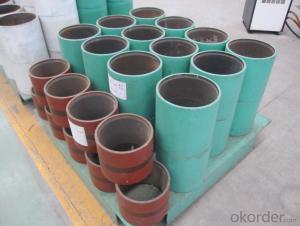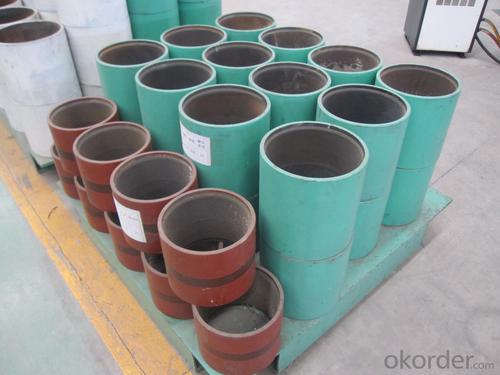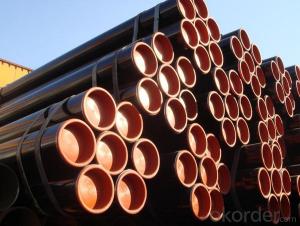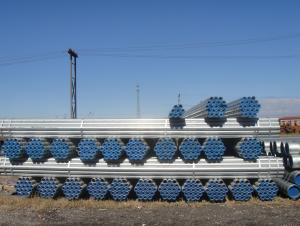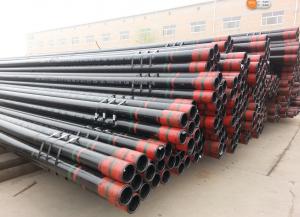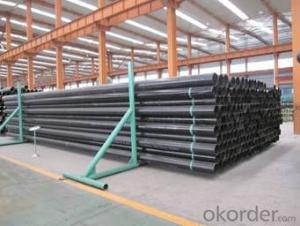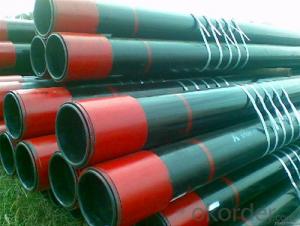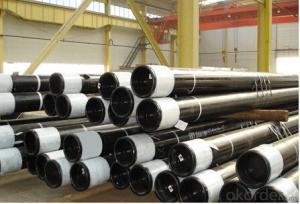API casing pipe thread
- Loading Port:
- China Main Port
- Payment Terms:
- TT OR LC
- Min Order Qty:
- -
- Supply Capability:
- -
OKorder Service Pledge
OKorder Financial Service
You Might Also Like
Std Ref.: API 5CT 5B ISO9001, 2008
Grade: J55,K55, N80-1,N80-Q,L80,C90,P110
Size: tubing 1.9"to4-1/2", casing 4-1/2"to13-3/8"
1.Grade: K55, N80-1, N80-Q, L80, C90, P110
2.We also supply permium thread products by customer's request
3.Size: tubing coupling from 1.9" to 4-1/2",Casing coupling fro4-1/2"to 13-3/8"
4.Type: NU, EU(tubing coupling), STC,LC,BTC(casing coupling).
5.Surface treatment: Whole phosphating, or inside phosphating and outside coating
6.Packing: By carton, wooden case, wooden pallet, or by requirements of customers
Otherwise, Our company manufactures and sells casing and tubing couplings,pup joints, tool joints, adapter pup-joints, adapter couplings, stabilizers, anchors of oil pumps and revolving sand gravitated device of well, etc. We always do business based on the principle of equality and mutual benefit, we provide the high quality and competitive price products.
- Q: Can steel pipes be used for oil and gas well production?
- Yes, steel pipes are commonly used for oil and gas well production due to their high strength, durability, and resistance to corrosion.
- Q: Is the same specification seamless steel pipe more expensive than welded pipe?
- You need to see this in the interval that diameter, such as seamless pipe and welded steel tube 530*20 mm compared to 5450 yuan per ton, seamless pipe, welded steel pipe, which is 4550 yuan, small diameter 10*2 mm, seamless pipe will require far 10000 per ton, just need more than 6000
- Q: How are steel pipes installed underground?
- Steel pipes are installed underground through a process called trenching, where a trench is dug to the desired depth and length. The steel pipes are then placed in the trench and secured using various techniques such as welding or threading. The trench is then backfilled, ensuring proper compaction around the pipes to provide stability and prevent movement.
- Q: How are steel pipes insulated to prevent heat gain?
- Steel pipes are insulated to prevent heat gain by applying a layer of thermal insulation material around them. This insulation material acts as a barrier, preventing the transfer of heat from the surrounding environment to the steel pipes. Additionally, the insulation is often covered with a protective outer layer to enhance its durability and resistance to external factors.
- Q: How are steel pipes used in the textile industry?
- Steel pipes are used in the textile industry to create a network of pipes for transporting water, steam, and other fluids that are crucial for various processes such as dyeing, washing, and finishing fabrics. These pipes ensure the efficient and reliable supply of these fluids, contributing to the smooth functioning of textile manufacturing operations.
- Q: What are the different types of steel pipe end connections?
- There are several types of steel pipe end connections, including threaded, socket weld, butt weld, flanged, and grooved connections.
- Q: What are the different types of steel pipe fittings for chemical processing plants?
- There are various types of steel pipe fittings used in chemical processing plants, including but not limited to, elbows, tees, reducers, flanges, and couplings. These fittings are designed to connect and control the flow of fluids within the piping system, ensuring safe and efficient operation in industrial settings.
- Q: How are steel pipes used in offshore wind farms?
- Steel pipes are used in offshore wind farms for a variety of purposes. They are commonly used as foundation structures to support wind turbine towers, providing stability and strength in the harsh marine environment. Steel pipes are also used for subsea cables and pipelines, allowing for the transportation of electricity and other resources. Additionally, they play a crucial role in the installation of offshore wind turbines, serving as installation aids and providing access for maintenance and repair activities. Overall, steel pipes are essential components in the construction, operation, and maintenance of offshore wind farms.
- Q: Seamless steel pipe 8162 and 8163 what is the difference?
- 8163 GB is fluid delivery tube, need to use eddy current detection, fluid transport, liquid, gas, solid, such as natural gas, water, gas, coal and stone, 8162 and 8163 of the popular point that is 8163 more than 8162 senior, 8163 inspection, 8162 inspection. I hope you understand!
- Q: How are steel pipes stored and transported?
- To ensure the safety and prevent damage of steel pipes, a systematic and efficient approach is employed for their storage and transportation. In terms of storage, designated areas are used to either horizontally or vertically stack the pipes. In the case of vertical stacking, custom-made racks or stands are utilized to provide support and prevent rolling or collapsing. This method not only saves space but also allows for easy accessibility when required. To safeguard steel pipes against corrosion and environmental elements, a layer of paint or other protective materials is often applied. Furthermore, pipes may be stored indoors in warehouses or storage facilities to shield them from unfavorable weather conditions. In terms of transportation, depending on the distance and destination, steel pipes are typically loaded onto trucks, railcars, or ships. Specialized equipment such as cranes or forklifts is employed to handle and load the pipes onto these vehicles. To prevent movement during transit, the pipes are tightly secured using straps, chains, or braces. This ensures stability and eliminates the risk of damage to the pipes themselves or other cargo. For long-distance transportation, steel pipes are often transported in bundles or stacks, reinforced to provide additional security. They may also be packed in protective coverings or containers to shield them from moisture, dust, or impacts. Overall, the storage and transportation of steel pipes necessitate meticulous planning, proper handling, and appropriate protective measures to uphold their integrity and quality throughout the entire process.
Send your message to us
API casing pipe thread
- Loading Port:
- China Main Port
- Payment Terms:
- TT OR LC
- Min Order Qty:
- -
- Supply Capability:
- -
OKorder Service Pledge
OKorder Financial Service
Similar products
Hot products
Hot Searches
Related keywords
